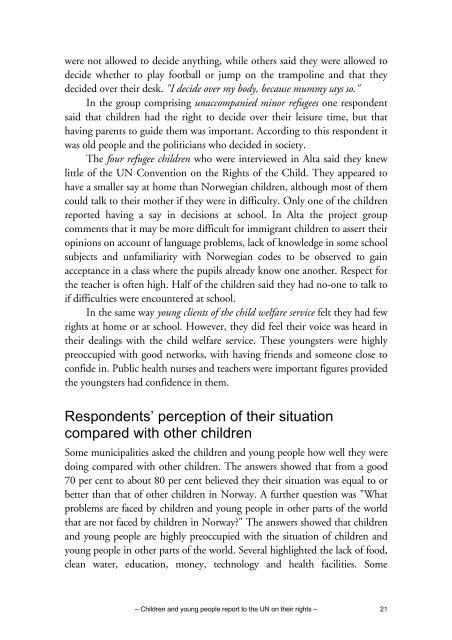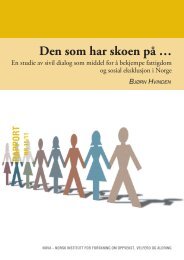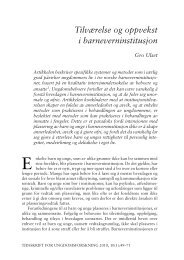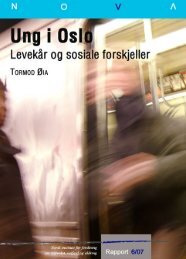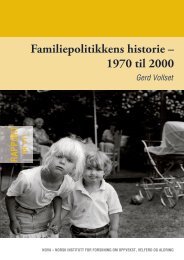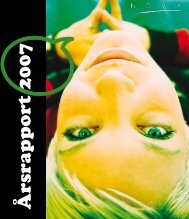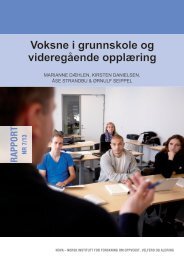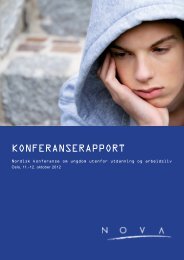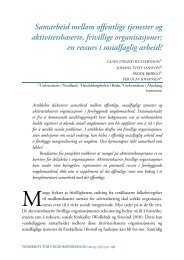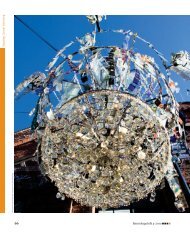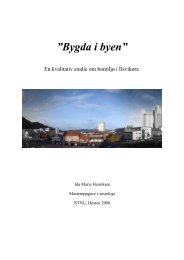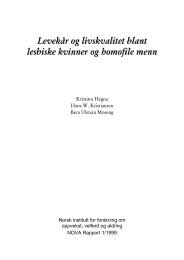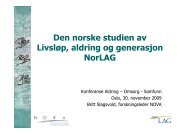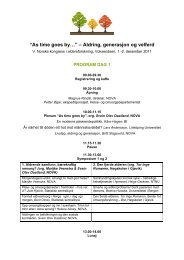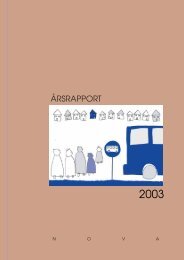children and young people report to the UN on their rights - Nova
children and young people report to the UN on their rights - Nova
children and young people report to the UN on their rights - Nova
Create successful ePaper yourself
Turn your PDF publications into a flip-book with our unique Google optimized e-Paper software.
were not allowed <str<strong>on</strong>g>to</str<strong>on</strong>g> decide anything, while o<str<strong>on</strong>g>the</str<strong>on</strong>g>rs said <str<strong>on</strong>g>the</str<strong>on</strong>g>y were allowed <str<strong>on</strong>g>to</str<strong>on</strong>g>decide whe<str<strong>on</strong>g>the</str<strong>on</strong>g>r <str<strong>on</strong>g>to</str<strong>on</strong>g> play football or jump <strong>on</strong> <str<strong>on</strong>g>the</str<strong>on</strong>g> trampoline <str<strong>on</strong>g>and</str<strong>on</strong>g> that <str<strong>on</strong>g>the</str<strong>on</strong>g>ydecided over <str<strong>on</strong>g>the</str<strong>on</strong>g>ir desk. "I decide over my body, because mummy says so."In <str<strong>on</strong>g>the</str<strong>on</strong>g> group comprising unaccompanied minor refugees <strong>on</strong>e resp<strong>on</strong>dentsaid that <str<strong>on</strong>g>children</str<strong>on</strong>g> had <str<strong>on</strong>g>the</str<strong>on</strong>g> right <str<strong>on</strong>g>to</str<strong>on</strong>g> decide over <str<strong>on</strong>g>the</str<strong>on</strong>g>ir leisure time, but thathaving parents <str<strong>on</strong>g>to</str<strong>on</strong>g> guide <str<strong>on</strong>g>the</str<strong>on</strong>g>m was important. According <str<strong>on</strong>g>to</str<strong>on</strong>g> this resp<strong>on</strong>dent itwas old <str<strong>on</strong>g>people</str<strong>on</strong>g> <str<strong>on</strong>g>and</str<strong>on</strong>g> <str<strong>on</strong>g>the</str<strong>on</strong>g> politicians who decided in society.The four refugee <str<strong>on</strong>g>children</str<strong>on</strong>g> who were interviewed in Alta said <str<strong>on</strong>g>the</str<strong>on</strong>g>y knewlittle of <str<strong>on</strong>g>the</str<strong>on</strong>g> <str<strong>on</strong>g>UN</str<strong>on</strong>g> C<strong>on</strong>venti<strong>on</strong> <strong>on</strong> <str<strong>on</strong>g>the</str<strong>on</strong>g> Rights of <str<strong>on</strong>g>the</str<strong>on</strong>g> Child. They appeared <str<strong>on</strong>g>to</str<strong>on</strong>g>have a smaller say at home than Norwegian <str<strong>on</strong>g>children</str<strong>on</strong>g>, although most of <str<strong>on</strong>g>the</str<strong>on</strong>g>mcould talk <str<strong>on</strong>g>to</str<strong>on</strong>g> <str<strong>on</strong>g>the</str<strong>on</strong>g>ir mo<str<strong>on</strong>g>the</str<strong>on</strong>g>r if <str<strong>on</strong>g>the</str<strong>on</strong>g>y were in difficulty. Only <strong>on</strong>e of <str<strong>on</strong>g>the</str<strong>on</strong>g> <str<strong>on</strong>g>children</str<strong>on</strong>g><str<strong>on</strong>g>report</str<strong>on</strong>g>ed having a say in decisi<strong>on</strong>s at school. In Alta <str<strong>on</strong>g>the</str<strong>on</strong>g> project groupcomments that it may be more difficult for immigrant <str<strong>on</strong>g>children</str<strong>on</strong>g> <str<strong>on</strong>g>to</str<strong>on</strong>g> assert <str<strong>on</strong>g>the</str<strong>on</strong>g>iropini<strong>on</strong>s <strong>on</strong> account of language problems, lack of knowledge in some schoolsubjects <str<strong>on</strong>g>and</str<strong>on</strong>g> unfamiliarity with Norwegian codes <str<strong>on</strong>g>to</str<strong>on</strong>g> be observed <str<strong>on</strong>g>to</str<strong>on</strong>g> gainacceptance in a class where <str<strong>on</strong>g>the</str<strong>on</strong>g> pupils already know <strong>on</strong>e ano<str<strong>on</strong>g>the</str<strong>on</strong>g>r. Respect for<str<strong>on</strong>g>the</str<strong>on</strong>g> teacher is often high. Half of <str<strong>on</strong>g>the</str<strong>on</strong>g> <str<strong>on</strong>g>children</str<strong>on</strong>g> said <str<strong>on</strong>g>the</str<strong>on</strong>g>y had no-<strong>on</strong>e <str<strong>on</strong>g>to</str<strong>on</strong>g> talk <str<strong>on</strong>g>to</str<strong>on</strong>g>if difficulties were encountered at school.In <str<strong>on</strong>g>the</str<strong>on</strong>g> same way <str<strong>on</strong>g>young</str<strong>on</strong>g> clients of <str<strong>on</strong>g>the</str<strong>on</strong>g> child welfare service felt <str<strong>on</strong>g>the</str<strong>on</strong>g>y had few<strong>rights</strong> at home or at school. However, <str<strong>on</strong>g>the</str<strong>on</strong>g>y did feel <str<strong>on</strong>g>the</str<strong>on</strong>g>ir voice was heard in<str<strong>on</strong>g>the</str<strong>on</strong>g>ir dealings with <str<strong>on</strong>g>the</str<strong>on</strong>g> child welfare service. These <str<strong>on</strong>g>young</str<strong>on</strong>g>sters were highlypreoccupied with good networks, with having friends <str<strong>on</strong>g>and</str<strong>on</strong>g> some<strong>on</strong>e close <str<strong>on</strong>g>to</str<strong>on</strong>g>c<strong>on</strong>fide in. Public health nurses <str<strong>on</strong>g>and</str<strong>on</strong>g> teachers were important figures provided<str<strong>on</strong>g>the</str<strong>on</strong>g> <str<strong>on</strong>g>young</str<strong>on</strong>g>sters had c<strong>on</strong>fidence in <str<strong>on</strong>g>the</str<strong>on</strong>g>m.Resp<strong>on</strong>dents’ percepti<strong>on</strong> of <str<strong>on</strong>g>the</str<strong>on</strong>g>ir situati<strong>on</strong>compared with o<str<strong>on</strong>g>the</str<strong>on</strong>g>r <str<strong>on</strong>g>children</str<strong>on</strong>g>Some municipalities asked <str<strong>on</strong>g>the</str<strong>on</strong>g> <str<strong>on</strong>g>children</str<strong>on</strong>g> <str<strong>on</strong>g>and</str<strong>on</strong>g> <str<strong>on</strong>g>young</str<strong>on</strong>g> <str<strong>on</strong>g>people</str<strong>on</strong>g> how well <str<strong>on</strong>g>the</str<strong>on</strong>g>y weredoing compared with o<str<strong>on</strong>g>the</str<strong>on</strong>g>r <str<strong>on</strong>g>children</str<strong>on</strong>g>. The answers showed that from a good70 per cent <str<strong>on</strong>g>to</str<strong>on</strong>g> about 80 per cent believed <str<strong>on</strong>g>the</str<strong>on</strong>g>y <str<strong>on</strong>g>the</str<strong>on</strong>g>ir situati<strong>on</strong> was equal <str<strong>on</strong>g>to</str<strong>on</strong>g> orbetter than that of o<str<strong>on</strong>g>the</str<strong>on</strong>g>r <str<strong>on</strong>g>children</str<strong>on</strong>g> in Norway. A fur<str<strong>on</strong>g>the</str<strong>on</strong>g>r questi<strong>on</strong> was "Whatproblems are faced by <str<strong>on</strong>g>children</str<strong>on</strong>g> <str<strong>on</strong>g>and</str<strong>on</strong>g> <str<strong>on</strong>g>young</str<strong>on</strong>g> <str<strong>on</strong>g>people</str<strong>on</strong>g> in o<str<strong>on</strong>g>the</str<strong>on</strong>g>r parts of <str<strong>on</strong>g>the</str<strong>on</strong>g> worldthat are not faced by <str<strong>on</strong>g>children</str<strong>on</strong>g> in Norway?" The answers showed that <str<strong>on</strong>g>children</str<strong>on</strong>g><str<strong>on</strong>g>and</str<strong>on</strong>g> <str<strong>on</strong>g>young</str<strong>on</strong>g> <str<strong>on</strong>g>people</str<strong>on</strong>g> are highly preoccupied with <str<strong>on</strong>g>the</str<strong>on</strong>g> situati<strong>on</strong> of <str<strong>on</strong>g>children</str<strong>on</strong>g> <str<strong>on</strong>g>and</str<strong>on</strong>g><str<strong>on</strong>g>young</str<strong>on</strong>g> <str<strong>on</strong>g>people</str<strong>on</strong>g> in o<str<strong>on</strong>g>the</str<strong>on</strong>g>r parts of <str<strong>on</strong>g>the</str<strong>on</strong>g> world. Several highlighted <str<strong>on</strong>g>the</str<strong>on</strong>g> lack of food,clean water, educati<strong>on</strong>, m<strong>on</strong>ey, technology <str<strong>on</strong>g>and</str<strong>on</strong>g> health facilities. Some– Children <str<strong>on</strong>g>and</str<strong>on</strong>g> <str<strong>on</strong>g>young</str<strong>on</strong>g> <str<strong>on</strong>g>people</str<strong>on</strong>g> <str<strong>on</strong>g>report</str<strong>on</strong>g> <str<strong>on</strong>g>to</str<strong>on</strong>g> <str<strong>on</strong>g>the</str<strong>on</strong>g> <str<strong>on</strong>g>UN</str<strong>on</strong>g> <strong>on</strong> <str<strong>on</strong>g>the</str<strong>on</strong>g>ir <strong>rights</strong> – 21


